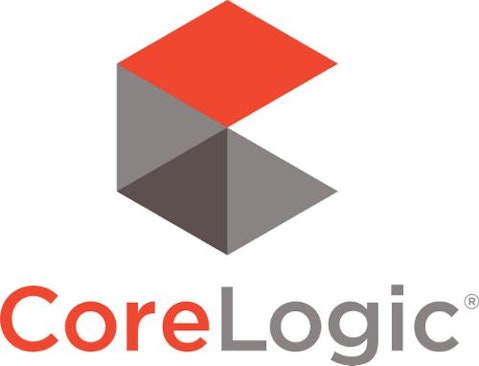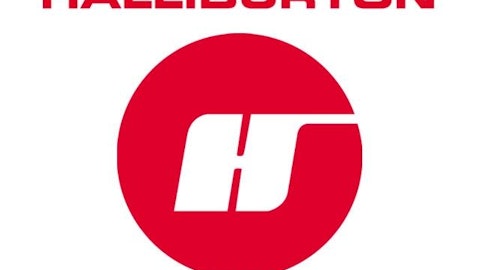
Corelogic was spun off of First American Financial Corp (NYSE:FAF) in 2010, and in the time since, the stock has returned close to 30%. Much in the same way that Lender Processing Services, Inc. (NYSE:LPS) spun off from its larger financial services entity, Corelogic is now able to focus on data and analytics for the residential real estate market, specifically for institutions that operate within today’s mortgage markets. Aside from its information services, Corelogic also has a range of secondary operations, including default processing and mortgage loan origination.
Over the past year, Corelogic has done a commendable job on the earnings front, generating EPS beats in five consecutive quarters. The company’s most recent beat came in its fiscal third quarter on October 24th, when it reported earnings of 45 cents a share versus 35-cent estimates. According to management, the positive surprise of nearly 30% came on the back of strong revenue growth across the board, with the quickest expansion seen in its Mortgage Origination Services segment, which grew 35.6% year over year. Frank Martell, Corelogic’s CFO, stated that most of these gains are “attributable to higher refinancing volumes, market share gains and increases in pricing in some business units.”
In addition to strong mortgage origination growth, the company also saw a YOY increase of 6.5% in its Data and Analytics segment, and Default Services were up 5.0% YOY. On the whole, operating income was up over 100% from the same time last year, and interestingly, it wasn’t due to improving market conditions as Martell so aptly stated on the conference call:
“This increase comes despite a continuing decline in overall market activity related to delinquent loans and foreclosures and was mainly attributable to higher volumes and operating efficiencies in field services and client wins related to loss mitigation programs.”
Also discussed in Corelogic’s Q3 earnings release was its seven-year deal with Dell Inc. (NASDAQ:DELL) to receive next-gen technology including upgraded security, cloud computing, infrastructure management services, and increased operating efficiency. Martell said it best though, when he described the program, which Corelogic is calling the Technology Transformation Initiative (TTI):
“Our launch of the TTI during the third quarter is a significant milestone for CoreLogic. We expect this multi-year initiative will provide the company with a state-of-the-art technology infrastructure, with new functionality, increased performance and an overall reduction in application management and development costs. The transformation of CoreLogic’s technology infrastructure is an integral part of our long-term strategic plan and is expected to substantially lower our cost profile. Importantly, the TTI will also provide a platform that enables and supports future growth.”
So in short, Corelogic is getting more profitably by getting leaner, despite adverse macroeconomic conditions. This likely explains why most analysts are quite bullish on the company’s ability to generate consistent earnings growth over the intermediate term, specifically over the next five years. The company is currently estimated to grow its EPS by an annual rate of 15.4% over the next half-decade. This is decidedly better than what Corelogic has experienced over the past five years, when EPS has shrank by a whopping 30.3% a year.
This growth differential in excess of 45% a year is larger than competitors like Lender Processing Services (+13.5%) and Fidelity National Information Services (NYSE:FIS) at -80.9%, and broad-level industry peers like First American Financial (+27.8%) and Fidelity National Financial Inc (NYSE:FNF) at -38.5%. While most of the other players in Corelogic’s industry seem to be wilting, the company’s TTI initiative looks to be the company’s saving grace.
From a valuation standpoint, though, it appears that investors aren’t appreciating Corelogic to its fullest potential. The company’s shares currently trade at a modest PEG of 1.5, which is below the likes of Lender Processing Services (2.6) and Fidelity National Financial (5.7). Interestingly, Fidelity National Information Services trades at earnings growth parity with Corelogic, while First American Financial is slightly cheaper, trading at a PEG of 1.3.
In terms of its cash hoard, Corelogic has generated top-level operating (132%) and free (228%) cash flow growth over the past year, but still trades at a P/CF ratio of 7.9X, and a P/FCF ratio of 7.6X. For the most part, this is cheaper than Lender Processing Services (16.7X, 7.8X), Fidelity National Information Services (17.4X, 14.8X), First American Financial (3.0X, 14.6X), and Fidelity National Financial (5.3X, 27.7X). When compared to historical averages, Corelogic’s cash flows currently trade at a near 10% discount, showing that there’s upside to be had no matter how way you slice the metrics.
Consequently, we may be able to understand why Corelogic has seen a rash of insider buying activity in recent weeks. Since October 26th, two days after the company released its Q3 earnings, three executives have purchased a combined 20,000 shares of stock worth $454,000. While this total isn’t mind boggling, it does come at a curious time. The biggest bulls of the bunch were CFO Frank Martell and Director Douglas Curling, responsible for three-fourths of the transactions. Five thousand shares were also purchased by CEO Anand Nallathambi. Here’s a complete look at the company’s insider purchasing record.
As mentioned above, individual investors can do well by mimicking insider trading activity, and Corelogic is a perfect example of this phenomenon. With an advantageous cost-reduction structure in place and bullish EPS forecasts going forward, now looks like a great time to consider buying shares of this company. Attractive valuation metrics are the icing on the proverbial cake, so to speak.





